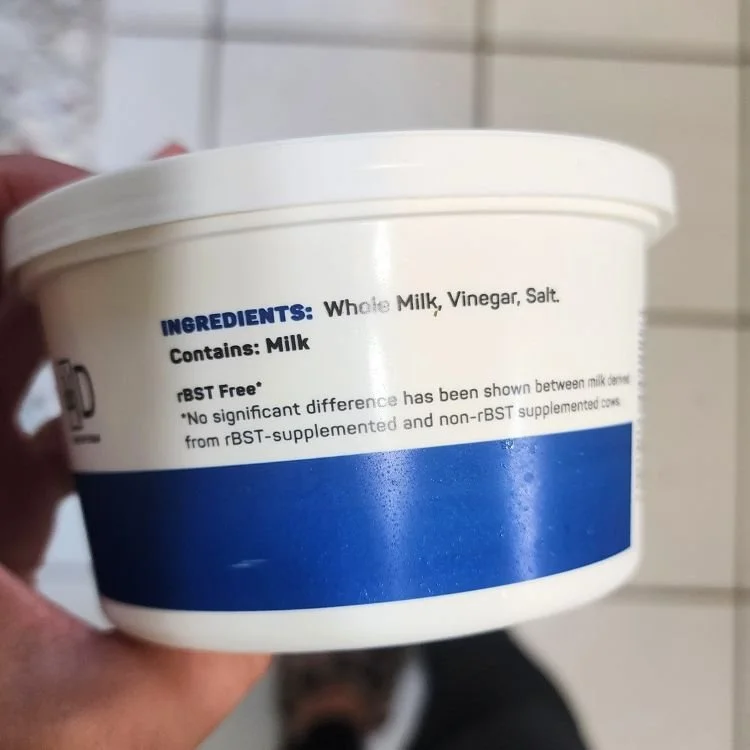What Are Bioengineered Foods and Why Should We Care?
Bioengineering of Food We’re Consuming
If you’re a label reader like me, you may have noticed something in recent months. The EXTREME use of bioengineered food ingredients. They’re everywhere, and yet, these ingredients are a bit obscure. Do you really know what they are? How they’re made? Or why they’re showing up in everything?
Essentially, bioengineered ingredients are the fancy new word for a GMO, or genetically modified organism - a plant, animal or microorganism whose genetics have been modified in a laboratory. Consumers weren’t clamoring to get their hands on foods labeled as GMO’s which also likely had to do with the push for “bioengineered.” In other words, they think we’re stupid, “let’s change what we call them so more people buy them.”
So why are we starting to see this on so many of our food labels, that prior to the name change weren’t labeled as a GMO food? Bioengineering is nothing new, but the FDA changed the way manufacturers needed to label these foods which contained GMO ingredients in January of 2022. Up until that point, foods that use GMO ingredients to make their products never used to have to label their products as containing GMO or bioengineered ingredients.
While food labels now must disclose their use of these ingredients (a good thing), the FDA has also given them an out. They don’t really have to disclose it. Instead, they can give a phone number with instructions to call or text for information, or a QR code that takes you to an online disclosure.
How Bioengineered Foods are Disclosed
That’s right, because label reading isn’t time-consuming enough they now want us to call, text or snap to actually find the information we’re wanting. Leave it to a government agency to make things as difficult as possible.
While most items do disclose (in teeny-tiny words under the ingredients list), I also found an instance of the more hidden disclosure this past weekend.
I was surprised to not see a bioengineered disclosure, when SO many chocolates have them, on a bag of Hershey’s Cookies and Cream Kisses. But sure enough, they did have a QR code and when scanned it brought it right up. Bioengineered.
Tell me…if they were proud of the fact they were using these GMO ingredients, why not disclose it where it can be easily found. After all, the average American isn’t going to know to scan a frickin’ QR code to find out if what they’re consuming is genetically modified. In fact, why not in BIG, BOLD letters right across the front of the bag, tell us we’re eating something genetically modified? There’s nothing wrong with it, right?
I think the answer is because they know we, at most, don’t want them, and at best, are skeptical of these products.
RIP Hershey’s (and almost every candy in the world).
So why should (or shouldn’t) we care about whether or not our food supply is genetically modified?
While manufactures of bioengineered food, the FDA and the USDA will tell you that they’re fine for consumption, I’m of the belief that there’s more to it than that.
Let’s talk about the supposed pros and cons of genetically modified foods.
GMO Pros
According to one of my (cough) favorite (cough) government agencies, the good ol’ FDA, GMO’s are beneficial for the following reason:
-GMO’s are resistant to damaging insects
-GMO’s have a tolerance to specific herbicides used to kill weeds.
-GMO’s are resistant to harmful plant viruses.
In the article I’ve linked to above, they conclude that less pesticides have to be used, saving money and reducing the amount of harmful chemicals that could potentially contaminate our food supply.
Additionally, herbicide-tolerant crops mean farmers won’t have to till as much of their soil, helping improve soil health, reduce erosion and lower the amount of fuel and labor used to produce their crops.
And of course, virus-resistant crops mean there is less likelihood of plants and crops being ruined from potential disease.
Trust me, there are countless of news articles confirming everything the FDA is telling us. I just don’t think it’s as simple as that.
GMO Cons
-According to the National Institutes of Health (another government agency), GMO foods, “can cause the development of diseases which are immune to antibiotics.” Great! Just what need - increased infections. Specifically, and explained in the article I reference below, “a genetically engineered maize plant from Novartis includes an ampicillin-resistant gene.” Ampicillin is used to treat chest infections (including pneumonia) and even dental abscesses.
The Center for Food Safety has a great article, (here, summarized below but I would highly recommend reading the full piece) discussing many of the issues, including antibiotic resistance, with GMO foods. One of the first topics is the fact that in 1998, the FDA admitted (in court no less) that “it had made, ‘no dispositive scientific findings,’ whatsoever about the safety of genetically engineered foods.” Oh.
They also call out other potential reasons to avoid GMOs:
-Toxicity: Food companies are essentially hoping their modifications don’t “destabilize” a food, causing non-toxic elements to suddenly become toxic. That doesn’t mean you suddenly keel over after one bite of something specific, but what happens to our bodies over time after consuming said ingredients?
-Allergic Reactions: GMO’s can transfer elements someone is allergic to, to foods that they thought were safe. Yikes! The New England Journal of Medicine actually proved this, by showing that when a gene from the Brazil nut was used in bioengineered soybeans, those with nut allergies had serious reactions to those soybeans.
Additionally, the foods that have been genetically modified also could cause thousands of new allergies because their genetic composition simply hasn’t been widely consumed.
-Immuno-suppression: The Lancet, a British medical journal studied the effects on rats, consuming bioengineered potatoes. Guess what?! Those rats showed “SIGNIFCANT detrimental effects on organ development, body metabolism and immune function.”
-Cancer: after approval was granted in the early 90’s to use GMOs, the FDA also approved rBGH, or recombinant Bovine Growth Hormone. Genetically engineered, it’s used to induce dairy cows to produce more milk. I have issues with that in general in terms of how humane that really is, but Canada and Europe have flat out given a big middle-finger to this drug, “citing numerous human and animal health concerns.” The concern? Their research has told them that the “levels of hormone called insulin-like growth factor-1 (IGF-1) are increased in dairy products” produced from said cows. Not surprising, our FDA, ignored a study showing increased IGF-1 in rBGH milk, “could survive digestion and make it’s way into the intestines and blood streams,” of those consuming it. Why should we care? Because studies (plural…meaning multiple!) show that IGF-1 helps facilitate the growth of breast cancer, prostrate cancer and colon cancer.
-Loss of Nutrition: while GMO food manufactures tout that their foods can produce foods that are higher in nutrients, that same technology can also decrease the amount of nutrients as well. I know by this time you’re going to be shocked, but, the FDA also ignored research (by their own researchers, no less) that showed unless farmers were proactively evaluating each food for these specific changes, we wouldn’t really know the accurate nutritional value. To date, they’ve never subjected any of these foods to mandatory testing.
Final Thoughts on Bioengineered Foods
After all of the above information and studies, at the VERY least, I think all of us should be taking an active roll in limiting the amounts of bioengineered foods we’re consuming.
Maybe you think the government and it’s agencies are “batting 1000.” I don’t agree. I’m under the belief if you dangled $100 bill in one hand and my life in the other, our federally elected officials would choose the $100 bill every single time. I don’t even think it would be a tough decision for them actually….they’d probably do it for a $1.
To our government, money talks. It’s why they ignore studies. It’s why they obscurely label products instead of being honest about what’s in them. The “deal’s already been done.” Meaning, the money’s likely already been given….I sense some more researching coming soon in terms of how exactly these things got approved.
Believe what you want to believe. Eat what you want to eat. BUT, even if it’s only occasionally, start eliminating these ingredients. Cook with fresh foods, start reading labels and truly begin to understand what you’re putting into your bodies.
Did you Find Value in This Article?
A List of GMO Foods
Keep in mind, many of these foods can be used as ingredients in other foods, which is why you’re seeing so many instances of them on labels. Corn syrup (made from GMO corn) in particular, is an ingredient in MANY processed foods.
alfalfa
apple (Arctic™ varieties)
Canola
Corn
Cotton
Eggplant (BARI Bt Begun varieties)
Papaya (rinspot virus resistant varieties)
Pineapple (pink flesh varieties)
Potato
Salmon (AquAdvantage)
Soybean
Squash (summer)
Sugarbeet



